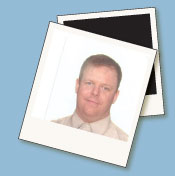

Aaron Marsaw
Biography
Aaron is a lawyer with the Department of Justice, providing legal counsel to the Department of Indian Affairs and Northern Development. After earning a B.A. from Laurentian University, he attended the University of Oxford on a Rhodes Scholarship. Aaron returned to Canada to pursue a law degree at the University of Toronto and was called to the Bar in November 2002. Prior to joining Justice, Aaron held a variety of jobs, including night court prosecutor for the City of Toronto, student employment officer for what was then Human Resources and Development Canada, research assistant, Parliamentary guide, and camp counselor at the CNIB Lake Joseph Centre. As well, he has a long record of volunteer and pro bono participation with community and outreach organizations. Aaron lost his sight in 1985, due to a brain tumour and cysts behind the optic nerve. He possesses approximately two per cent peripheral vision in his right eye only. To assist in performing tasks both at home and work, Aaron uses a variety of adaptive technologies, including closed-circuit television (CCTV) magnification, computer screen magnification as well as screen reading software, and a scanner.
Audio
Making the Most of the “Informational Interview” as Part of Your Job Search Strategy
Aaron Marsaw, Lawyer, Department of Justice
Aaron Marsaw, a lawyer with a visual impairment, spoke about using the “informational interview” as part of a job search strategy. He began with a story about his own experience of networking and how his network grew as a result of sending thank-you notes to those who spoke with him when he was first looking for work.
Marsaw emphasized the importance of networking. It is about talking to people, asking questions, obtaining information, sharing experiences, and making connections. The informational interview is really just networking, he said, but in a structured way. And networking is something to be used throughout life and one’s various careers.
The informational interview has two main purposes:
- Gaining as much information as possible
For example, learn everything possible about an organization, a particular line of work, job prospects, level of competition, labour market trends, courses and skills needed, and so on. An effective job search includes seeking information on how to target specific jobs and hidden job opportunities.
- Marketing yourself
By asking questions and letting others know about your search for work and for information, you are, in a sense, making your availability for hire known. But rather than ask outright for a job, present yourself in the best light and leave an impression that can be shared throughout an organization. Contacts such as these can easily lead to job opportunities. However, you must still meet the qualifications for the job; hiring is never based purely on connections.
How to structure a job search and start up a network? Marsaw recommended researching professional associations, finding and contacting prominent people in the field, and being organized about who to contact and how to approach each person. The campus employment office and the Internet are valuable resources.
Start by sending a cover letter. Express an interest in learning about the organization and the person’s work, Marsaw said. Say that you will be in touch shortly to arrange a meeting, and then follow up by telephone within the specified period.
When conducting an informational interview, keep in mind the questions that you want to ask—for example, questions about the knowledge area and the physical place where you are interested in working. Try to meet face to face. If an in-person interview is impossible, settle for a telephone call. If a call is impossible, settle for e-mail. However, remember that attitude and body language can convey far more than a resumé alone.
Marsaw suggested meeting as many people as possible and researching as many organizations as possible. Ask questions that are valuable to your search and that show your knowledge. Ask about their experience, and answer their questions to develop a good picture for them of who you are and what qualifications you bring. Always ask for the names of two or three other people that you can contact, because that is how a network grows.
At the end of the interview, ideally your contact will ask for a resumé. And you may be asked if you have more questions. Always take advantage of this final opportunity to stand out from the crowd, to sell your skills, and to obtain more information of value.
Occasionally, the interview contact may not be interested. In that case, end the meeting after two or three questions, Marsaw recommended. Better to leave a positive impression than to extend an unproductive interview. But, no matter how minimally helpful the contact’s advice was, send a thank-you note, he suggested. Marsaw also encouraged participants not to get discouraged if the search starts off slowly.
The informational interview is only one part of a job search strategy, but it can be very effective. In fact, such an interview helped Marsaw find his job in the federal government. As a result of talking to people, his resumé was widely circulated, and he was hired for an unadvertised position.
Over the years, said Marsaw, your network will continue to build and serve as a valuable source of ongoing advice. Reciprocation is also important. “If someone asks you for an informational interview, never [avoid helping] them; always give what you can.”
